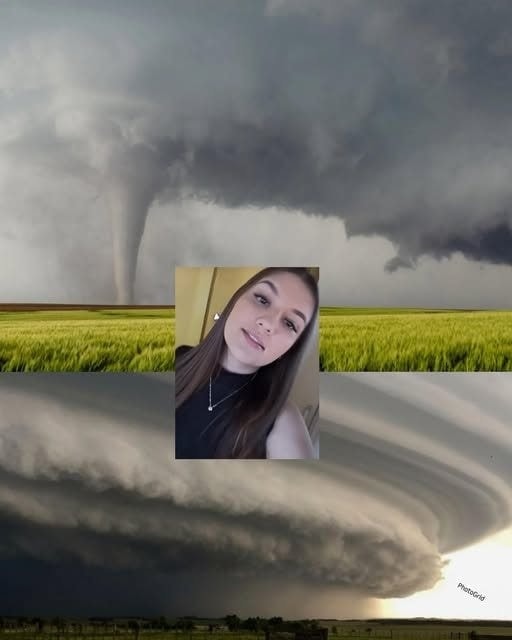The small town of Ibiporã, in Brazil’s southern state of Paraná, awoke this week to heartbreak. A powerful tornado had torn through the community, claiming the life of a 14-year-old girl and leaving behind devastation that words can barely describe.
What began as an ordinary afternoon—a sky calm, a breeze soft—spiraled into a tragedy no one could have imagined. Within minutes, a peaceful neighborhood was reduced to rubble: homes splintered, trees uprooted, streets buried in silence. Amid the wreckage lay the loss that would shake an entire town—the life of a teenager whose kindness and light had touched nearly everyone around her.
The storm struck with almost no warning. Locals remember how the sky changed—blue to gray, gray to furious black. Then came the sound. “It was like a freight train,” one witness said, “roaring straight through the houses.” Roofs were ripped away, cars tossed into fields, power lines torn down. In that chaos, the 14-year-old had been helping her mother close windows and gather the family’s pets when a piece of flying debris struck her. Emergency teams arrived as soon as the winds died, but by the time they reached her, it was too late.
She was the only child of two local schoolteachers—beloved in town for their warmth and devotion to their students. Friends describe her as gentle, curious, and endlessly kind. She adored animals, volunteered at the local shelter, and dreamed of becoming a veterinarian. Her teachers remembered her as the quiet force who lifted others up, the kind of student whose presence filled a room—and whose absence now leaves it hollow.
“She was sunshine,” one teacher said during a candlelight vigil. “Always smiling, always asking how others were before talking about herself. It’s impossible to imagine the school without her.”
Her parents, too shattered to speak publicly, are mourning privately. A family friend told reporters the couple is “utterly broken” but deeply moved by the flood of compassion from neighbors and former students. “They spent their lives giving love through education,” the friend said. “Now the town is giving that love back.”
Today, Ibiporã resembles a war zone. Streets are choked with fallen trees, homes stand roofless, and fragments of lives—books, toys, photographs—are scattered across the mud. Tornadoes are rare in Paraná, but meteorologists say violent weather is becoming more common as climate patterns shift. Rising temperatures and humidity, they warn, are creating conditions ripe for storms in regions once thought safe.
For the people of Ibiporã, that warning is now heartbreakingly real. Local officials are already discussing better early-warning systems and community drills. “We had less than ten minutes’ notice,” one official said. “That’s not enough for families to act—especially in rural areas with weak communication networks. We have to do better.”
And yet, in the storm’s aftermath, the town’s resilience has shone through. Within hours, residents were clearing debris, checking on neighbors, and organizing food and clothing drives. The local school—where the girl studied—became the center of both relief and remembrance. Students filled the halls with flowers, candles, and letters. Walls are now covered with drawings, each one a small, heartfelt tribute.
“She helped everyone,” one classmate said through tears. “When my dad was sick, she made a card and got the whole class to sign it. That’s just who she was.”
At her memorial service, hundreds gathered despite the rain. Teachers spoke about her love of science and her dream of studying at a university in Curitiba. Friends read poems in her honor. Her parents, standing together in silence, held each other as candles flickered in the wind. When the school choir sang her favorite song, even the strongest among them wept.
In the days that followed, volunteers and counselors arrived to support families traumatized by the disaster. The mayor declared three days of mourning, flags across Paraná flew at half-staff, and churches opened their doors for prayer and comfort.
Meteorologists later confirmed that the tornado’s winds reached more than 180 kilometers per hour—strong enough to tear brick from walls. But the deepest scars left behind weren’t physical. For Ibiporã, the true devastation was emotional: a young life taken far too soon, and the ache of a community left behind.
Still, from that loss has come purpose. Town leaders plan to establish a scholarship in the girl’s name, dedicated to students pursuing studies in environmental science and meteorology—a way to turn tragedy into legacy.
As one teacher said during the vigil, “She believed in helping others, even when no one was watching. Maybe the best way to honor her is to make sure what happened to her helps protect others in the future.”
In the corner of the school courtyard, beneath the tree where she used to sit at lunch, there is now a simple wooden bench. A small plaque bears her name and a single inscription:
“She brought light to the storm.”
For the people of Paraná, that light—her kindness, her laughter, her short but radiant life—will keep shining long after the winds have passed.
